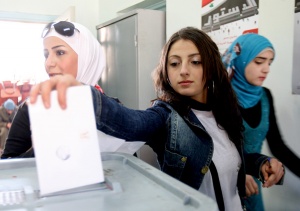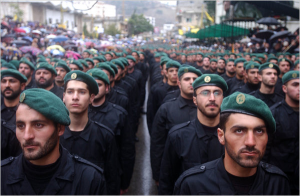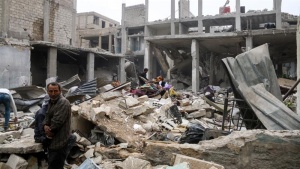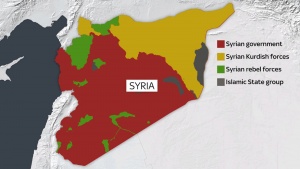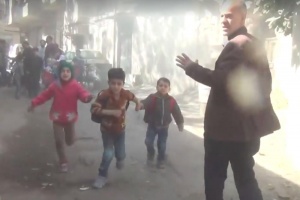Syria remains a disaster; for the people who remain there, for those who’ve fled but hope one day to return and for those who seek a sound, diplomatic solution. The catalog of actors operating in the theater, even at this late date, is increasingly alarming: Syrian pro-government forces, Syrian rebels, ISIL-terrorists, Russian armed forces, and U.S. coalition forces. International actors like Russia and the United States claim to have entered the conflict to subvert the threat of ISIL. Both sides dispute the other’s rationale. But when direct military contact occurs between the United States and Russia, that threatens not only the goal of reducing ISIL terror but the stability of the whole international order.
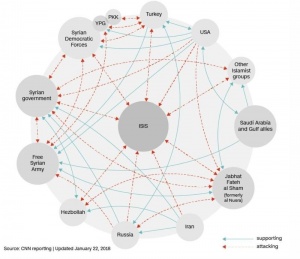
Graphic by Anastasia Beltyukova and Henrik Pettersson for CNN[1]
Innumerable horrors have emerged from the region since the Syrian Civil War’s start. Each is terribly important, but ISIL’s offenses engender a category of sadism and butchery that cannot be ignored. ISIL engages in genocidal campaigns against minority populations like Yazidis, Christians, and Shia Muslims. It has murdered internationally protected journalists in manners too barbaric for mass media consumption and advocates extremist violence the world over[2]. This only scratches the surface of ISIL’s crimes.
The United States committed to combating and reducing the ISIL threat in 2014. In concert with European and Middle Eastern allies, the U.S. supported regional friends with a crippling campaign of airstrikes directed against ISIL. The advent of Russian intervention, however, complicated things. In 2015, Bashar al-Assad’s regime requested Russian assistance in combating Islamic extremists and rebel factions alike. Though ISIL has been significantly reduced since 2014, the U.S. and Russia maintain daily military operations in Syria. Global concerns mounted in February 2018 when pro-government forces, backed by Russian mercenary squads, attacked U.S. forces and Syrian allies.
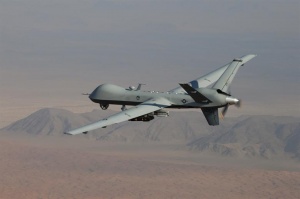
© U.S. Air Force Photo/ Lt. Col. Leslie Pratt[3]
Another case in point, a U.S. drone destroyed a Russian made T-72 battle tank on February 10th, 2018. No U.S. or allied troops were killed, but reports indicate three Russian affiliates died in the tank [4]. The T-72 in question was reportedly moving, with coordinated indirect fire, on a position held by coalition advisors and Syrian Democratic Forces, the latter of which is a Syrian rebel group supported by the United States and its allies[5]. This incident followed another assault in which pro-Syrian forces attacked coalition troops on February 7th and 8th. U.S. coalition forces are reported to have killed 100 Syrian operatives following this unprovoked attack on coalition headquarters [6].
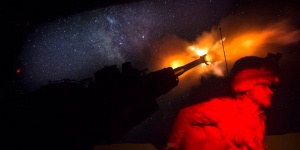
US Marines firing a howitzer in Syria © US Marine Corps
Questions persist regarding Russia’s motivation in the conflict. Since its intervention, it has consistently bombed rebel groups allied against Bashar al-Assad [7]. To justify its strikes, Russia labels as terrorists any group contending for power with Assad. Russian operations have helped the regime dramatically reduce the rebel threat while leaving the lion’s share of the ISIL fight to the American-led coalition. At this point in the conflict, with the threat of ISIL reduced, Russian and American backed proxies, to say nothing of national forces, are increasingly coming into conflict with each other, as February’s developments prove.
We may never know who was killed in the tank or how many Russians died in the February 8th coalition forces assault, but the escalating conflict between the world’s sole superpower and its former cold war adversary helps no one, especially not Syrians whose homeland has become an arena where international scores may be settled. US-Russian relations are at a low due to Syria, Russia’s annexation of Crimea, and allegations of Russian interference in the 2016 U.S. election. Further conflict promises to exacerbate an already fraught bond.
ISIL should remain the focus of American and Russian military operations. The so-called caliphate has been diminished, but it has not been defeated. Its calls for extremist violence have been heard across the world. The U.S. has witnessed ISIL-inspired violence in San Bernardino, Orlando, and in the bombing and vehicular attacks in New York City. A Russia-bound commercial airliner over Egypt was bombed out of the sky by ISIL. Bombs claimed by ISIL have exploded in the metros of St. Petersburg. American and Russian nationals have traveled to Syria, fought for ISIL, and threaten to wage further conflict upon their return home. ISIL and its propaganda remain virulent threats to both nations.
The Syrian Civil War is rightfully viewed as one of the great geopolitical cataclysms of the young, 21st century. Hundreds of thousands of people are dead and millions have been displaced, yet peace remains elusive. These great powers should be working together, not at odds, to resolve global conflicts. Better US-Russian commitment to avoiding concentric operational areas mitigates the likelihood of further conflict. To be sure, awareness of one another’s airspace exists, however, each country must honor such arrangements. As long as the Syrian Civil War drags on, the possibility of even more destructive conflict remains. It seems self-evident that resolving the civil war should be everyone’s priority.
Disagreements between the U.S. and Russia would hardly disappear were the two to resolve their differences over Syria, but so doing would remove two adversaries from a kinetic combat zone and remove a critical issue that’s currently impeding bilateral relations. A resolution would allow each nation to fight international and regional terrorism directly rather than eliciting proxy warfare in the guise of fighting terror. For the Middle East’s sake and that of the rest of the world, the United States and Russia must do better.
Sources:
[1] https://www.cnn.com/2016/08/25/middleeast/syria-isis-whos-fighting-who-trnd/index.html
[2] http://www.aljazeera.com/news/2016/03/isil-committed-genocide-minority-groups-isis-160317132446363.html
[3] http://www.af.mil/About-Us/Fact-Sheets/Display/Article/104470/mq-9-reaper/
[4] http://www.foxnews.com/world/2018/02/13/us-drone-destroys-russian-made-tank-in-syria-in-self-defense-officials-say.html
[5] http://www.businessinsider.com/video-of-us-destroying-russian-t-72-tank-in-syria-with-drone-strike-2018-2
[6] http://www.businessinsider.com/us-syria-killed-100-russian-syrian-backed-fighters-2018-2?r=UK&IR=T
[7] https://www.theguardian.com/politics/2015/dec/01/syria-airstrikes-everything-you-need-to-know
Click here to learn more about Ahmad Mohibi, Founder of Rise to Peace
